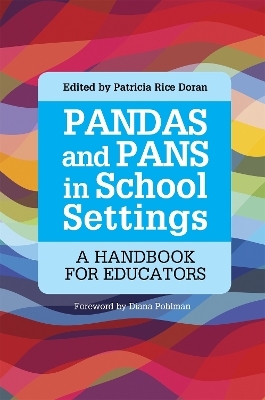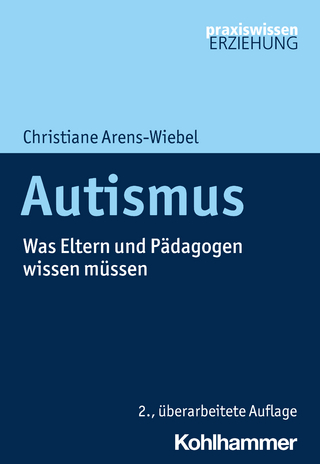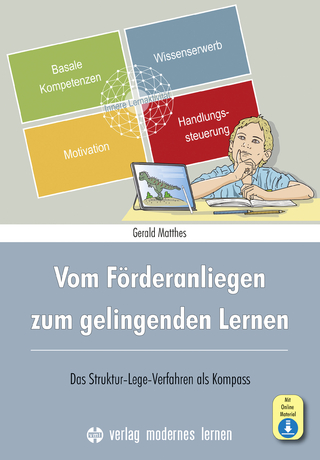
PANDAS and PANS in School Settings
Jessica Kingsley Publishers (Verlag)
978-1-84905-744-8 (ISBN)
PANDAS (Pediatric Autoimmune Neuropsychiatric Disorders Associated with Strep) and PANS (Pediatric Acute-Onset Neuropsychiatric Syndrome) occur when an abnormal immune response produces brain inflammation, leading to unusual psychological symptoms in children. Symptoms can include OCD, tics, ADHD, anxiety disorders, sensory issues and marked personality changes.
This practical handbook explains how educators can distinguish between these symptoms and pre-existing conditions, and offers strategies for supporting students with PANDAS and PANS in school settings. Contributions from experts provide educators with the understanding needed to be able to collaboratively identify PANDAS and PANS, and carry out effective interventions. As the rate of incidence of PANDAS and PANS increases, this book will be an essential resource for school staff in getting to grips with these complex disorders and overcoming the challenges they present.
Patricia Rice Doran is Assistant Professor of Special Education at Towson University, Maryland. Her research and teaching focus on neurodevelopment, assessment and instruction of diverse learners, and inclusive practices. She holds a doctorate in special education from the George Washington University, along with an MA from the University of Michigan and a BA from the University of Notre Dame. She lives outside Baltimore, Maryland.
Dedication. Acknowledgements. Foreword. Introduction. 1. What are PANDAS and PANS, and Why Do Educators Need to Know? Patricia Rice Doran, Ed.D., Assistant Professor of Special Education, Towson University, Maryland, USA. 2. Parent and Family Voices: Perspectives on PANDAS/PANS. Sarah Alleman, Wendy Nawara, Amy Corselius and Anonymous. Edited by Patricia Rice Doran. 3. Education Professionals' Voices: Perspectives on PANDAS/PANS. Megan DeRitter, M.Ed., Instructional Guide, Monarch Academy, Glen Burnie, MD, Mary Crombez, M.Ed., Laura Cook, LSW and Melissa Giampietro. 4. Medical History and Context of PANDAS and PANS. Margo Thienemann, M.D., Clinical Professor of Psychiatry, Stanford University School of Medicine, USA. 5. PANDAS/PANS in the General Education Classroom: Creating a Brain-Friendly Learning Environment. Darlene Fewster, Associate Professor of Special Education, Towson University and Patricia Rice Doran. 6. Collaborative Planning for Students with PANDAS and PANS. Patricia Rice Doran. 7. Academic Accommodations and Supports for Students with PANDAS/PANS. Amy Mazur, Ed.D., Retired Professor of Special Education, The George Washington University, Washington D.C., USA. 8. Sensory and Motor Considerations for Children with PANDAS/PANS. Janice Tona, Ph.D., OTR, Clinical Assistant Professor of Rehabilitation Science, The University of Buffalo-SUNY, USA. 9. Emotional and Behavioral Impact: Considerations for Planning and Practice. Kandace M. Hoppin, Ed.D., Assistant Professor of Special Education, Towson University. 10. Transition Considerations for Students with PANDAS/PANS. Kathleen Stein, Ph.D., Associate Professor of Special Education, Towson University. Afterword. Reimagining School Paradigms: What PANDAS/PANS Can Teach Us. Patricia Rice Doran. Appendices. Appendix A: Sample Physician Letter. Appendix B: PANDAS and PANS: Quick Facts for Teachers. Index.
| Co-Autor | Margo Thienemann, Darlene Fewster, Amy Mazur, Janice Tona |
|---|---|
| Zusatzinfo | 6 black and white photographs |
| Verlagsort | London |
| Sprache | englisch |
| Maße | 150 x 226 mm |
| Gewicht | 440 g |
| Themenwelt | Sozialwissenschaften ► Pädagogik ► Sonder-, Heil- und Förderpädagogik |
| ISBN-10 | 1-84905-744-3 / 1849057443 |
| ISBN-13 | 978-1-84905-744-8 / 9781849057448 |
| Zustand | Neuware |
| Haben Sie eine Frage zum Produkt? |
aus dem Bereich


